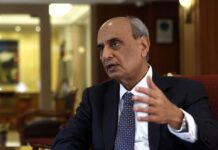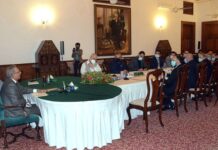Mushtaq Ahmad Yousufi, the greatest-ever Urdu language satirist, in one of his trademark quips said that Muslims of undivided India thrived only in one business – skins and leather, and that too of the unfortunate animals they had earlier consumed.
Witticism apart, there is more than a grain of truth in this adage. Being a top Pakistani banker himself, and knowing the commercial qualities of the Chinioti businessmen who had by then started making their presence felt among the country’s business fraternity, Yousufi might actually have been alluding to them.
The other principal mercantile community in India, the Hindus, detested dealing in leather owing to their religious beliefs. That creed provided not merely an opening for Muslims but the great break for a near monopoly in the tannery business.
Though they diversified in the post-partition era, during the Raj this was the main source of wealth of Pakistan’s now largest and perhaps the most influential and thriving business community, the hard-working and shrewd Chiniotis. They can, perhaps by stretching it a bit, be compared to the western businessmen of Calvinist views, such as the legendary John D. Rockefeller, who were noted for their almost obsessional money-making drive, and whose work ethic comprised worshipping six days in business and the seventh in church, living frugally and donating generously to philanthropic and altruistic causes.

This raises another question: Having thrived in a monopoly situation by default, with some honourable exceptions aside, could this be the reason why it has become second nature for a considerable portion of the Pakistani business community, to always be drawn towards cartels, subsidies and government handouts? And to blame everyone else under the heavens, and especially the government of the day, for their abysmal incapacity to compete as equals in world markets?
Fascination with Chiniot and Chiniotis
Dr Amjad Saqib may have outgrown his initial gripping attraction, but his lingering fascination with Chiniot and Chiniotis, instilled in his early twenties when he was posted there as Assistant Commissioner, has endured to this day. The author of two books that relate directly to his posting there (Shehr-e Lab-e Darya, alluding to this central Punjab city’s location along the river Chenab, and Ek Yadgar Mushaira, on a poetry recitation gala that he organized, he has now performed his literary hat-trick – his magnum opus spread over 400-plus pages on the Chinioti Sheikhs, their ancestry and roots and how through their genetic commercial savvy, they have, not only individually, but on a collective level, created an amazing rags to riches story.

Dr Amjad Saqib is a man of many parts and for all seasons: an MBBS doctor by education and training, he sat through the civil service competitive examination, standing first in written and third overall, as was inducted into the elite DMG service. He resigned from this promising and socially assured position to chase a seemingly impossible dream – creating his own NGO, Akhuwat, devoted to interest-free microfinance. And by his personal conviction and passion, he managed to transform this unlikely venture into a hugely successful, one-of-its-kind enterprise in the world in the process. Emboldened, he also started an education endowment program, financed by the Punjab government, whereby all students, irrespective of their financial standing, received scholarships and stipends, based purely on their scholastic scores. Now he is raising the Akhuwat University, in which admission will be open for all students of proven talent, again irrespective of their capacity to meet the educational expenses. On top of this, Dr Amjad writes in chaste Urdu, and has more than half a dozen books to his credit, with his travelogue of Nepal,Gautam ke Des Main, a standout in literary terms.

Chiniotis soar
His latest work, ‘Kamyab Log’ (Successful People – the Story of Chinioti Entrepreneurship) is more of a chronicle, outlining Chiniot’s history, its architecture, its people, but mainly an attempt to analyse what makes the city’s business community tick. The second chapter consists of 30 interviews with the most prominent success stories, owners of sprawling business empires who, coming from humble backgrounds some 150 years ago, spread across the entire sub-continent – first sweating it out in the market pits and business cauldrons and then, with a bold capitalist spirit, setting up small businesses in far-away Indian cities, and Burma (now Myanmar). The third part highlights 24 major traits on which these commercial empires were based and built literally from scratch. The second and third part form the bulk of the book.
Read one interview after another and all 30 of them, apart from some minor divergent detail here and there, follow more or less the same pattern: well-deserved paeans to their ambitious grandparents and parents, who instilled in their wards their remarkable work ethic, and the accounts of their shrewd business acumen. If you’ve read one, you’ve read them all.
Still, the book is an absorbing account of an intrepid community with a natural talent for business.
Close to the end of the first chapter, the author asks a rhetorical question: Are the Chinioti Sheikhs the richest community in Pakistan now? He doesn’t quite expound further on that, the conjecture being that, in his view, they are.
By the 1970’s, three Chinioti groups – Colony, Crescent and Nishat – were already vast behemoths, and were counted among the richest ‘22 Families’ in the country, a somewhat demeaning term coined by the world-renowned development economics guru, Dr Mahbub-ul-Haq, then the chief economist at the Planning Commission of Pakistan, suggesting that this lofty eminence was actually obtained through capturing and monopolising national resources, which had resulted in inequitable distribution of wealth at the national level.
The figures were indeed staggering: 80 percent of banks, 70 percent of insurance companies and 66 percent of the industry, Dr Mahbub maintained, had been cornered by these 22 families.
Field Marshal Ayub Khan’s ill-advised ‘decade of progress’ celebrations only served to raise passions against his own rule and also the business empires of the ‘22’. This situation was instantly seized upon and political mileage gained by Z.A Bhutto’s PPP in the western half of the country and Mujibur Rehman’s Awami League in East Pakistan, with Habib Jalib’s fiery poetry also stirring the crowds and drumming up public support for their social and political egalitarian programs, paving the way for the post-1971 nationalisation.
The 1970s saw the decline of the Gujarati Memons – until then the prime movers and shakers in the country’s economy in all sectors, and their waning influence was a coinciding catalyst for the Chiniotis’ waxing. The latter were not overly impacted by the nationalization of the 1970s. Amongst the richest groups in 1970, the highest ranked Chinioti was at fifth; by 1990 it was second and by 1997, top of the profit charts – with the richest Pakistani acknowledged to be Mian Mohammad Mansha, chairman of the Nishat conglomerate. The book hints that Nishat’s acquisition of the golden-goose Muslim Commercial Bank acted as the force multiplier for the group, forcing all rivals to play catch-up.
To be fair to the author, who is otherwise gushing in describing the Chiniotis’ scrupulous work -ethic, he also does not completely omit the fact that sometimes their deliberate courting of well-positioned politicians also reaped rich dividends. A case in point, not mentioned in the book, is that of S.M. Naseer, who in the 1960s acquired from the government the iconic Civil and Military Gazette, where Rudyard Kipling, master storyteller of the Raj and poet laureate to Queen Victoria, once worked.. His eye was probably on the paper’s prime real estate situated smack in the middle of the Mall. It may have made this Chinioti a few, well considerable, bucks but it destroyed a historic building and replaced it with that mercantile monstrosity – the Panorama Centre.
Are they really special?
Throughout this extensive saga of Chiniotis’ phenomenal growth spread over six generations, in which they hit the ground running even after abandoning their businesses on the wrong side of the border during Partition, surviving the separation of East Pakistan and Bhutto’s nationalization, both of which affected the Memon community more, and dealing adroitly with the shifting political landscape, the narrative leans towards presenting them as paragons of financial practices and orthodoxy, adhering to religion-based values.
The usual formulae for prolonged success in business – vision, energy, industry, daring to take risks, innovation, inventiveness, to go wherever opportunity beckons, the occasional sleight of hand in shortchanging the government, provided one gets away with it – is age-old and universal. The Chiniotis neither invented it, nor would they be the last to employ it to create huge fortunes. Regardless of which neck of the woods in the world they belong to, tycoons do not become tycoons because of their virtues alone, but also because of their single-minded pursuit of, you guessed it right, wealth creation.

Across the border, Dhirubhai Ambani came from nowhere and over one generation, leapfrogged over Tatas, Birlas’ and other industrial colossus built over two centuries. It was widely believed that he had the ‘knack’ of being in sync with the system and making the regulators work for him. There was nothing kosher in this, and his Cinderella story is not far different than that of our own fly-by-night barons – and it must frankly be admitted here that some later Chiniotis also share the same dubious traits.
Wrapping the entire Chinioti community in the cloak of pristine business practices and so-called devotion to religious values may be overstating the reality a bit. Yet the fact that so many of them have achieved unparalleled success over a prolonged period in a constantly shifting-sands political scenario and uncertain economic environment, is remarkable in itself. According to Dr Amjad Saqib, the 1868 census puts the number of Chinioti Sheikhs at 8,000, about 1,000 families, and now they are numbered at 300,000 – around 40,000 families, give or take a few, and many are now taking up vocations other than the traditional trading one. But they will always stand out as business pioneers of the Muslim community from the time of the Raj, and their overall contribution in building up Pakistan’s industrial base, almost non-existent in 1947, far transcends their community’s limited numbers.
‘Opportunities are always on the lookout for you’
Mian Mansha
Nishat Group
Nishat Group is acknowledged to be the largest conglomerate and its founder and CEO Mian Muhammad Mansha the wealthiest man in the country. After the death of his father in 1968, he called off his education in England to join the family business. Though Mian Mansha was heir to a major legacy, yet he made a name for himself in the 1970s and 80s owing to his suave business practices and hard work. His star really became ascendent post his acquiring MCB at it its privatisation in 1991. Following are the excerpts of an interview from the book.
On decision-making:
“Decision making is an important aspect. Those who lack the decision-making power are often left behind in life. I often say to my friends in jest that every decision that I took swiftly turned out to be successful while those decisions that I made after due consideration didn’t pay off. It’s possible that several of your decisions remain unsuccessful, but one correct one taken at the right moment may atone for all those misses.”
On new opportunities:
“A new and better opportunity is always looking for you. All my life I’ve looked for such opportunities. I never dithered when starting a new business. Ideas and businesses need to be explored. I travel the world and every time I find something new, I try to evaluate it from different angles.”
On passion for work:
“Nothing makes me happier than work. Sometimes I wake up in the middle of the night and pace around my bedroom – anxiously waiting for the dawn so I that could go to work. When I went to the US for education, I saw that people there loved their work. Today businessmen from all over the world are my friends. And none that I know of became successful without hard work.”
On his two principles:
“I believe only two principles are enough to be successful: The ability to organize and the ability to delegate. If someone can organize himself, then he can run as big an organization as any. Secondly, by delegating you can do many things at the same time. When you delegate, you gain the sense of responsibility and that becomes the reason for growth.”
‘Glory lies in hard work’
Javed Iqbal Wohra
Mayfair Group
“Looking for work, my father went to Calcutta, where he was employed by a Chinioti Sheikh. No work was below his dignity. He swept and cleaned his shop himself. It took him long, but when we had become successful, a man came to see him. I saw my father offer his chair to the man. When he left my father told me that the man’s father had imbued in him many tricks of the trade. Now that we had grown big while the man’s fortunes had taken a dip, my father still had all the respect for him. Similarly, I have never forgotten my patrons. I wish we all remember: those who forget their patrons can never succeed.”
On consistency and hard work:
“My father understood that running business is not easy. Buying skins, collecting and transporting them, when transportation system was not that good – it was hard work, day in and day out. The one who is aware of his strengths and his weaknesses always stands in good stead. In business, he was also convinced of the need to diversify.”
On courage in the face of adversity:
“My father took some decisions in his life that were damaging, to the extent that at one point he was not left with enough resources to get himself treated. But he demonstrated courage in the face of adversity. Picking himself up, he started again with his brothers as partners. My uncle established a chocolate factory, a decision before its time, as no one in Pakistan then had developed a taste for it. Gradually we understood how important planning is before starting any business.”
On rising again after a fall:
“Our hard work started paying off but all of a sudden political situation in Karachi deteriorated, and we had to shut down our factories. Despite being the largest taxpayers in the confectionery sector, the government didn’t offer any assistance. My father said, rising again after a fall is a Chinioti tradition and so we started afresh, with Mayfair Spinning.
‘Business is an art, not a science’
Ahmad Kamal
Kamal Group
“Business is not a science, it’s an art. I got to learn a lot from my father and grandfather. My grandfather had a modern mindset and convinced of the importance of change. He used to wake up at 5 a.m. offer prayers, and recite the Quran. He listened to BBC news regularly. The habit of thoughtfulness and pondering allowed him the ability to comprehend. Sometimes he used to say, “I am not very educated, perhaps that’s why I became a successful businessman. If I was well educated, I might have looked for a good job or have been a secretary [munshi].
“Business is not always two-plus-two. It is in a manner of speaking, arrangement of resources. And the true purpose of a businessman is to bring resources together. People, workers, money, equipment, technology, mutual relations, and systems – all these are resources. I am not educated from a foreign university. I learned all this from my father, grandfather and from my own experiences.
“Few important principles to me are: Diversity in business; change and compatibility; benefitting from latest skills; timely decision making; benefitting from the experiences of successful predecessors; cutting your coat according to your cloth and recognizing important moments in partnerships.
On success not going to one’s head:
“Another Chinioti quality is: success does not go to our head. When one reaches a certain point, one finds another Chinioti entrepreneur standing ahead, and it goes on and on. This mutual competition is not negative, it rather works as an inspiration.”
On the features of success:
“From our elders, we have learnt four ingredients of success: migration and travel, hard work and intelligence, refraining from extravagance, and conservation and appropriate use of resources. My father used to give me another advice. To err is human, but to repeat it is foolhardiness.”
On types of education:
“We value education but it should be according to the demands of the business. If you have to work in the spinning industry, you don’t need an international education. If you have to do international trading or become associated with multinational companies, then you need to be foreign qualified. I believe that businesses don’t run only on degrees, rather on education that is according to the requirements of a particular business. I also say that our elders’ decisions should not be criticized. They did what was the best given the resources they had.”
On not having the knack for politics:
“I have no shame in accepting that while the Chiniotis might have gone very far in the world of business but they have not been equally successful in other fields. For example, we have not been able to achieve any political success. We are successful in the politics of chamber and trade associations but not in general politics. Perhaps it [the rigmarole] does not suit our temperament, or maybe the rules are entirely different.”
On success being a ‘relay race’:
“Success is like a relay race. One generation runs to a particular point, and the baton is passed on to the next generation. If the next generation has the ability to run the distance, the progress continues. But for this non-sentimental, objective thinking is a must. A Chinioti father abdicates his position for his son in his lifetime, after having imparted to him the elements of success. Landlords don’t do that.”























